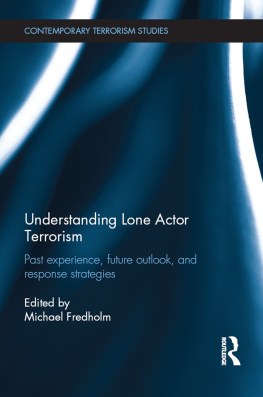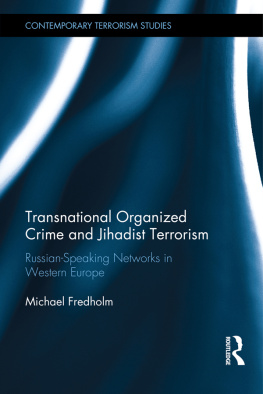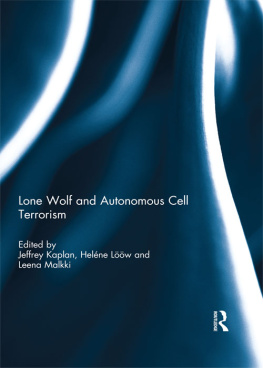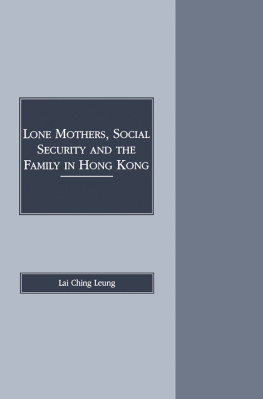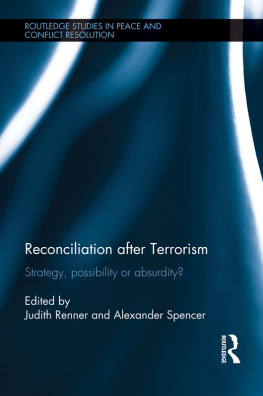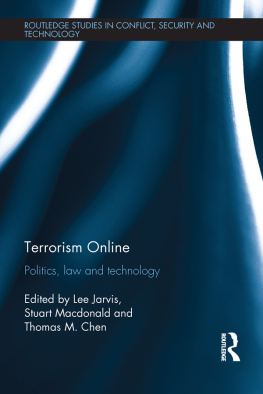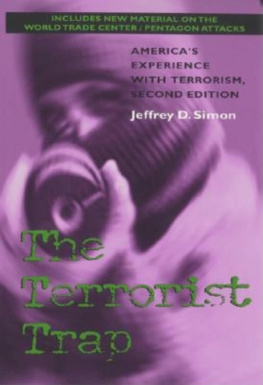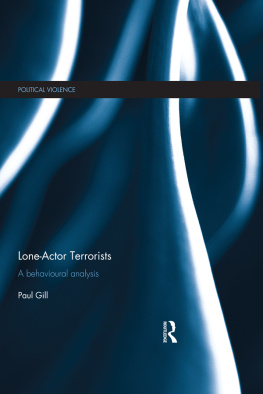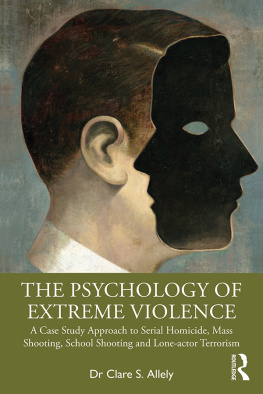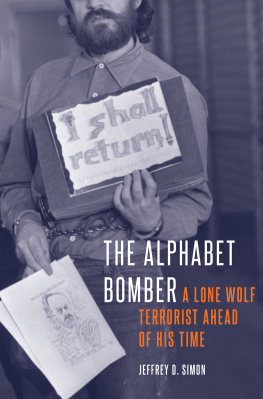Understanding Lone Actor Terrorism
This volume examines the lone actor terrorist phenomenon, including the larger societal trends which may or may not have led to their acts of terrorism.
With lone actor terrorism becoming an increasingly common threat, the contributors to this volume aim to answer the following questions: What drives the actions of individuals who become lone actor terrorists? Are ideological and cultural issues key factors, or are personal psychological motives more useful in assessing the threat? Do lone actors evolve in a broader social context or are they primarily fixated loners? What response strategies are available to security services and law enforcement? What is the future outlook for this particular terrorist threat? Although these issues are frequently discussed, few books have taken a global perspective as their primary focus. While many books focus on lone actor terrorists in relation to terrorist groups, such as Al-Qaida and the Islamic State, few, if any, cover lone actors of all ideological backgrounds, including the variants of active shooters and malicious insiders in information security, such as Edward Snowdenwith both of these latter categories constituting an important variant of lone actors. Utilizing the expertise of academics and practitioners, the volume offers a valuable multidisciplinary perspective.
This book will be of much interest to students of terrorism and counterterrorism, political violence, criminology, security studies and IR.
Michael Fredholm is an Historian and Military Analyst, currently affiliated to the Stockholm International Program for Central Asian Studies (SIPCAS), Sweden. He is author of several books, including, most recently, The Shanghai Cooperation Organization and Eurasian Geopolitics (2012).
Contemporary Terrorism Studies
Understanding Terrorist Innovation
Technology, tactics and global trends
Adam Dolnik
The Strategy of Terrorism
How it works, why it fails
Peter Neumann and M.L.R. Smith
Female Terrorism and Militancy
Agency, utility, and organization
Edited by Cindy D. Ness
Women and Terrorism
Female activity in domestic and international terror groups
Margaret Gonzalez-Perez
The Psychology of Strategic Terrorism
Public and government responses to attack
Ben Sheppard
The De-Radicalization of Jihadists
Transforming armed Islamist movements
Omar Ashour
Targeting Terrorist Financing
International cooperation and new regimes
Arabinda Acharya
Managing Terrorism and Insurgency
Regeneration, recruitment and attrition
Cameron I. Crouch
Religion and Political Violence
Sacred protest in the modern world
Jennifer L. Jefferis
International Terrorism Post-9/11
Comparative dynamics and responses
Edited by Asaf Siniver
Talking to Terrorists
Concessions and the renunciation of violence
Carolin Goerzig
Freedom and Terror
Reason and unreason in politics
Abraham Kaplan and Gabriel Weimann
Evaluating Counterterrorism Performance
A comparative study
Beatrice de Graaf
The EU and Counter-Terrorism
Politics, polity and policies after 9/11
Javier Argomaniz
The Evolution of EU Counter-Terrorism
European security policy after 9/11
Raphael Bossong
Conducting Terrorism Field Research
A guide
Edited by Adam Dolnik
USUK Counter-Terrorism after 9/11
A qualitative approach
Edgar B. Tembo
Transforming Violent Political Movements
Rebels today, what tomorrow?
Kevin Grisham
Radicalization in Western Europe
Integration, public discourse and loss of identity among Muslim communities
Carolin Goerzig and Khaled Al-Hashimi
Putting Terrorism in Context
Lessons from the Global Terrorism Database
Gary LaFree, Laura Dugan and Erin Miller
Al Qaedas Global Crisis
The Islamic State, takfir, and the genocide of Muslims
V. G. Julie Rajan
Social Networks, Terrorism and Counter-Terrorism
Radical and connected
Edited by Martin Bouchard
Understanding Lone Actor Terrorism
Past experience, future outlook, and response strategies
Edited by Michael Fredholm
Hamas, Popular Support and War in the Middle East
Insurgency in the Holy Land
Richard Davis
First published 2016
by Routledge
2 Park Square, Milton Park, Abingdon, Oxon OX14 4RN
and by Routledge
711 Third Avenue, New York, NY 10017
Routledge is an imprint of the Taylor & Francis Group, an informa business
2016 selection and editorial matter, Michael Fredholm; individual chapters, the contributors
The right of the editor to be identified as the author of the editorial matter, and of the authors for their individual chapters, has been asserted in accordance with sections 77 and 78 of the Copyright, Designs and Patents Act 1988.
All rights reserved. No part of this book may be reprinted or reproduced or utilised in any form or by any electronic, mechanical, or other means, now known or hereafter invented, including photocopying and recording, or in any information storage or retrieval system, without permission in writing from the publishers.
Trademark notice: Product or corporate names may be trademarks or registered trademarks, and are used only for identification and explanation without intent to infringe.
British Library Cataloguing-in-Publication Data
A catalogue record for this book is available from the British Library
Library of Congress Cataloging-in-Publication Data
Names: Fredholm, Michael, editor.
Title: Understanding lone actor terrorism : past experience, future outlook, and response strategies / edited by Michael Fredholm. Description: Abingdon, Oxon ; New York, NY : Routledge, 2016. | Series: Contemporary terrorism studies | Includes bibliographical references and index.
Identifiers: LCCN 2015035493| ISBN 9781138100510 (hardback) | ISBN 9781315657622 (ebook)
Subjects: LCSH: Terrorism. | TerroristsPsychology. | CrimeSociological aspects.
Classification: LCC HV6431 .U34744 2016 | DDC 363.325dc23
LC record available at http://lccn.loc.gov/2015035493
ISBN: 978-1-138-10051-0 (hbk)
ISBN: 978-1-315-65762-2 (ebk)
Typeset in Baskerville
by Wearset Ltd, Boldon, Tyne and Wear

